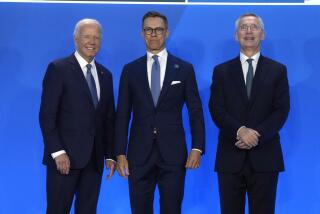U.S. Won’t Deploy Missiles Once Pact Is Signed, Shultz Says
- Share via
BRUSSELS, Belgium — Secretary of State George P. Shultz said today that U.S. deployment of cruise missiles in Western Europe will stop as soon as a superpower arms pact is signed, even though the deal won’t take effect immediately.
Technically, the United States could continue with scheduled missile deployments even after next month’s scheduled treaty signing at the superpower summit in Washington, Shultz said.
The pact to eliminate shorter- and intermediate-range nuclear missiles wouldn’t take force until it is ratified by the U.S. Senate, which could take months. Shultz said the United States would “kind of hold things constant” until then, thus affecting NATO plans to deploy 208 more missiles in the next 13 months.
Until recently, the United States had been urging NATO allies to continue with the scheduled missile deployments until the ratification process was complete.
Some of the allies, including Belgium, had insisted that they would not accept more missiles once the treaty was signed.
Soviet leader Mikhail S. Gorbachev is scheduled to arrive in Washington on Dec. 7 for the summit, which runs through Dec. 10.
Senate Approval Uncertain
It is not clear whether the treaty will win the necessary two-thirds Senate approval.
If it is ratified, removal will begin immediately of the 364 U.S. Tomahawk cruise and Pershing 2 ballistic nuclear missiles already deployed in four European NATO countries, Shultz said.
Already, conservative Republicans have criticized the agreement, which Shultz completed Tuesday in Geneva with Soviet Foreign Minister Eduard A. Shevardnadze. (Story, Page 8.)
Shultz stopped in Brussels on his way back to Washington and briefed the 15 NATO members from Western Europe and Canada on the outcome of the discussions.
Hans-Dietrich Genscher, the West German foreign minister, and other allied officials said after meeting with Shultz that they were pleased with the outcome of the Geneva negotiations and hoped the Senate would ratify the treaty.
“This is a treaty that we feel is our treaty, an alliance treaty, not just one between the United States and the Soviet Union,” said Giulio Andreotti, the Italian foreign minister.
Scrapped Over 3 Years
Since 1983, the United States has deployed 256 cruise missiles in West Germany, Britain, Italy and Belgium, and 108 Pershing 2 ballistic missiles in West Germany.
Under the agreement, these will be scrapped over three years, along with 683 Soviet missiles armed with 1,565 nuclear warheads.
Before his news conference at NATO headquarters, Shultz said the pact is a “first step” in reducing nuclear weapons.
Shultz said the treaty contains “more intrusive” inspection procedures than ever before.
Shultz said Soviet inspectors will be at bases in West Germany, Britain, Italy and Belgium. He said the NATO allies had expressed no qualms about the Soviet presence.
More to Read
Sign up for Essential California
The most important California stories and recommendations in your inbox every morning.
You may occasionally receive promotional content from the Los Angeles Times.










